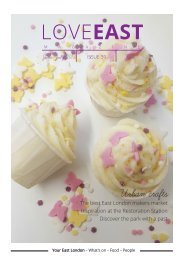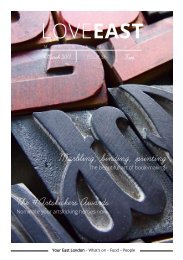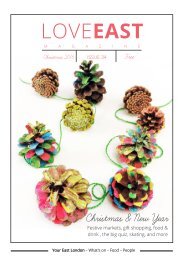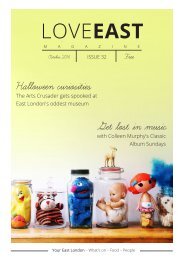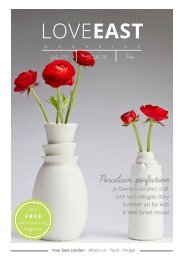June 2016
Create successful ePaper yourself
Turn your PDF publications into a flip-book with our unique Google optimized e-Paper software.
The wine guide<br />
time. Only a handful of wines with very specific<br />
characteristics such as provenance, tannin and<br />
refined oak maturation will actually improve with<br />
bottle ageing. If in doubt, ask.<br />
Screw cap or cork? What's the difference?<br />
Cork allows some air to enter the bottle, slowly<br />
maturing the wine inside. Screw caps don’t. Corks<br />
very occasionally spoil a wine with a substance<br />
called TCA. While completely safe, it can make<br />
your favourite vino smell like wet cardboard –<br />
hence the term “corked wine”.<br />
What is a natural wine?<br />
Though the latest buzzword, there is no clear<br />
definition of a “natural wine”. Commonly, it’s a wine<br />
produced from biodynamic or organic grapes<br />
using very limited intervention during vinification.<br />
No filtration, no fining and no added sulphites.<br />
Philippe, Eugenio and Jack: wine advisers at Vinarius<br />
The wine experts at Vinarius,<br />
the enoteca<br />
*<br />
on the Roman,<br />
help to demystify Britain's<br />
favourite tipple<br />
Polyphenols, cold maceration, Botrytis cinerea,<br />
Ehrenbreitsteiner (wait, there’s really a grape<br />
variety called that?)... wine babble can sour even<br />
the most diehard aficionado’s relationship with<br />
fermented grape juice.<br />
That’s why the role of a wine adviser shouldn't<br />
just be to suggest the best wine for a particular<br />
occasion, but also to put the customer at ease,<br />
explaining and demystifying what can at times<br />
seem a rather intimidating subject.<br />
Here are some of the most common questions<br />
we get asked at our wine shop and bar on the<br />
Roman, with answers in plain English:<br />
Is it true that wines improve with age?<br />
The vast majority of red wines and nearly all white<br />
wines are not made to be kept for a very long<br />
What is tannin?<br />
Tannin or tannins are substances found mainly<br />
in grape skins and seeds. In a wine, they are what<br />
cause that drying or astringent sensation in the<br />
mouth. If you’re feeling ambitious, try a strong<br />
black tea to see what very high levels of tannin<br />
taste like.<br />
Why do wine prices vary so much?<br />
Quality wines are generally more expensive<br />
to produce. Like any other product, it also<br />
depends on the economy of scale (big or small<br />
producer) as well as supply and demand. All in all,<br />
appellation or typology (what wine it is), producer<br />
(who makes it) and vintage (year of production)<br />
are the three single most important factors.<br />
Do I need to decant the wine before serving?<br />
Wine and oxygen are best friends, yet<br />
worst enemies. The two have a complicated<br />
relationship, but generally the only wines that<br />
need to breathe prior to serving are those with<br />
very high levels of tannin from older vintages.<br />
In these cases, decanting a bottle of wine one<br />
hour before serving can help accelerate the<br />
oxygenation process and separate any sediment.<br />
* Enoteca: not only a versatile, rustic wine shop and<br />
wine bar, but also an important centre of wine and<br />
food culture.<br />
Vinarius, 536 Roman Rd, London E3.<br />
vinarius.london<br />
32 LOVEEAST








